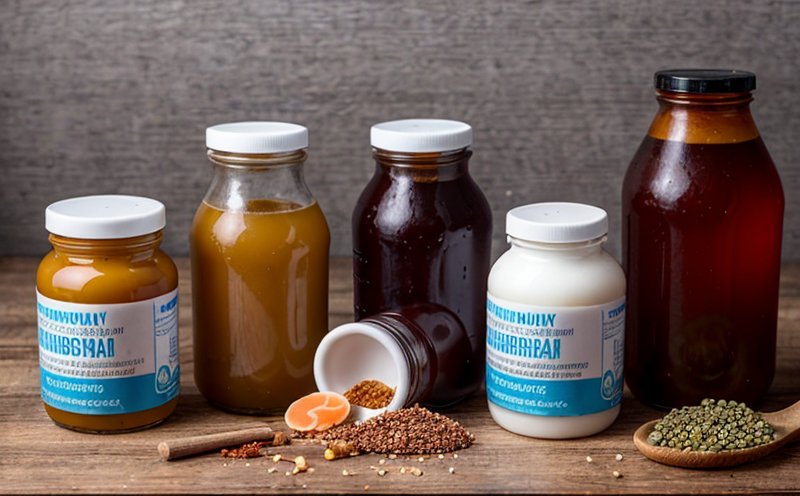EN 15662 Pesticide Residue Microbial Degradation Testing
The EN 15662 standard outlines a method for determining the microbial degradation of pesticides in probiotics and fermented products. This service is crucial for ensuring that the use of pesticides does not compromise the safety, efficacy, or integrity of these health supplements and foodstuffs.
Microbial degradation testing evaluates how quickly and effectively specific microorganisms break down pesticide residues under controlled conditions. This process helps manufacturers understand the potential risks associated with pesticide usage in their products and ensures compliance with regulatory standards.
The testing procedure involves several key steps, including:
- Sample preparation: The probiotic or fermented product sample is carefully prepared to ensure accurate representation of the tested material.
- Pesticide application: A known quantity of pesticide is introduced into the sample at a concentration relevant to real-world conditions.
- Incubation and microbial inoculation: The sample is incubated under controlled conditions, with specific microorganisms added to begin the degradation process. These microorganisms are selected based on their relevance to human gastrointestinal flora or environmental conditions.
- Monitoring: Over time, the pesticide levels in the sample are monitored at regular intervals using sensitive analytical techniques such as High Performance Liquid Chromatography (HPLC) or Gas Chromatography-Mass Spectrometry (GC-MS).
- Data analysis: The rate of degradation is calculated based on the observed decrease in pesticide concentration over time. Compliance with regulatory limits and acceptance criteria is determined.
This testing method provides valuable insights into the stability and safety of probiotics and fermented products containing pesticides, which are increasingly popular in dietary supplements and functional foods. It helps manufacturers make informed decisions about ingredient selection and production processes to ensure product quality and consumer safety.
Compliance with EN 15662 is essential for companies operating within the European Union, as it ensures that their products meet stringent environmental protection requirements and do not pose health risks due to pesticide residue.
Benefits
Implementing EN 15662 Pesticide Residue Microbial Degradation Testing offers numerous benefits for both manufacturers and consumers:
- Regulatory Compliance: Ensures that products meet the stringent requirements set by regulatory bodies, thus avoiding potential legal issues.
- Safety Assurance: Provides assurance that pesticides do not adversely affect product quality or pose health risks to consumers.
- Innovation Support: Facilitates the development of safer and more effective probiotic and fermented products, enhancing market competitiveness.
- Customer Confidence: Builds trust with customers by demonstrating a commitment to high-quality standards and safety practices.
The test results can also be used for marketing purposes, highlighting the company's adherence to international standards and its dedication to producing safe and effective products.
Customer Impact and Satisfaction
By ensuring that pesticide residues are effectively degraded in probiotics and fermented products, this testing service directly impacts customer satisfaction. Customers value products that are not only safe but also meet their nutritional expectations. The results of the EN 15662 test can be communicated to customers through marketing materials or product labels, thereby enhancing brand reputation and loyalty.
Manufacturers who invest in such testing services gain a competitive edge by being able to demonstrate adherence to international standards. This transparency fosters trust among consumers, leading to increased sales and market share. Moreover, the data generated from these tests can be used internally for continuous improvement of manufacturing processes and product formulations.
Use Cases and Application Examples
The EN 15662 testing is particularly relevant in several use cases:
- New Product Development: Manufacturers can use this test to evaluate the degradation of pesticides in new probiotic or fermented product formulations before they enter production.
- Packaging Optimization: Understanding how pesticides degrade under different packaging conditions helps companies optimize their packaging materials and storage practices to maintain product integrity.
- Supply Chain Management: By knowing the degradation rates of pesticides, supply chain managers can make informed decisions about sourcing ingredients from suppliers who use appropriate pesticide management practices.
- Quality Control: Regular testing ensures that products consistently meet quality and safety standards throughout production runs.
For example, a company developing a new probiotic supplement containing a specific type of pesticide may use this test to determine the optimal level of pesticide application and ensure that it is fully degraded before consumption. Another example could be a manufacturer of fermented milk products who uses this test to monitor the degradation process during different stages of production.





